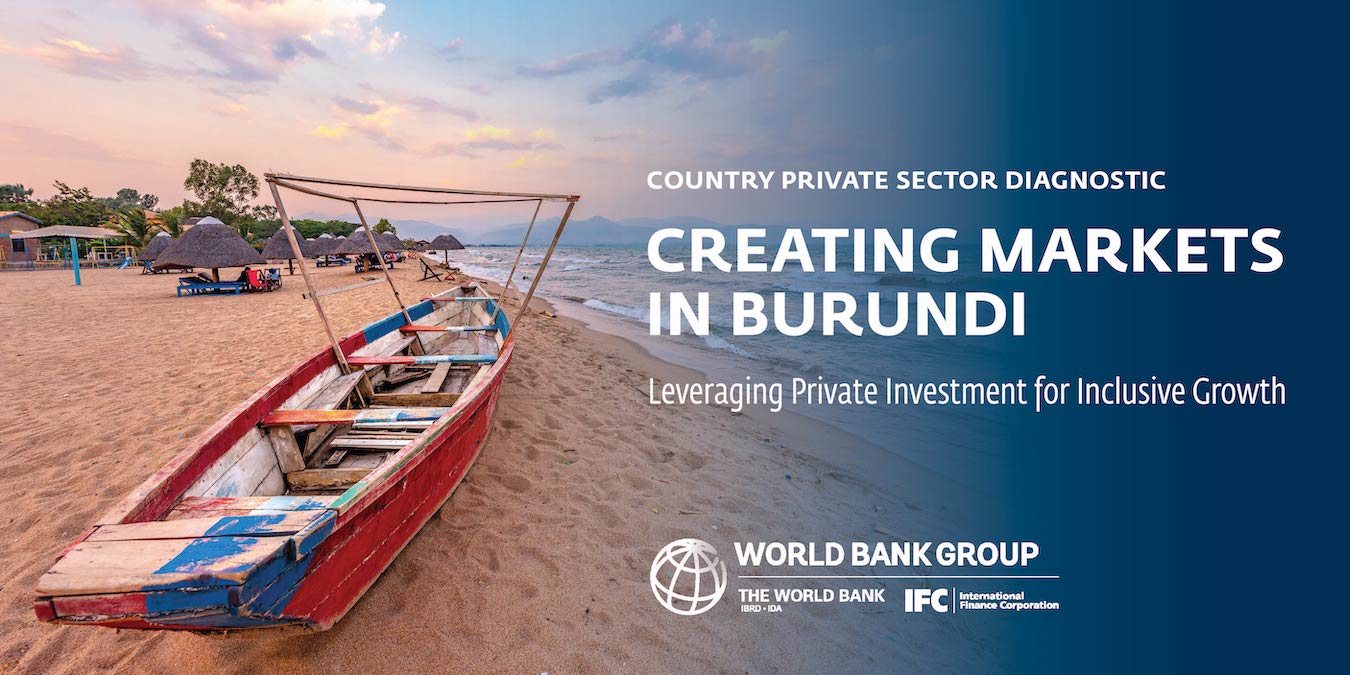
Bujumbura, Burundi, November 2, 2022 — By strengthening its private sector and improving its business environment, Burundi has the opportunity to create more jobs, accelerate economic growth and attract more foreign direct investment, according to a report published today by IFC and the World Bank. Reforming the country's state-owned enterprises would also create space for more private actors and support for startups and smaller businesses.
The Burundi Country Private Sector Diagnostic (CPSD), jointly prepared by IFC and the World Bank, explores the challenges and opportunities for private sector development across Burundi's economy, particularly in areas that could drive economic transformation. It comes as the country is working to recover from the economic effects of the COVID-19 pandemic and new challenges, including rising global inflation and higher prices for food and fuel.
"Burundi's economic potential could be unlocked through a series of key reforms that provide the foundations for private sector-led investment," said Malick Fall, IFC Country Manager for Burundi. "A strong and engaged private sector will support the country to create jobs and generate more opportunities for Burundi's citizens. IFC and the World Bank are working closely together to help Burundi achieve this goal."
"With support from private sector actors and its development partners, the World Bank Group is optimist that Burundi will undertake the needed macroeconomic and structural reforms to attract more domestic and international private investments in the finance and agribusiness sectors that will contribute to a stronger, sustainable and more inclusive growth," said Hawa Cissé Wagué, World Bank Country Manager for Burundi.
The Burundi CPSD recommends concrete improvements to Burundi's financial services sector, including easing access to finance for small and medium-sized enterprises and expanding digital financial services by strengthening the credit infrastructure, setting up a National Payment Council and developing shared banking platforms.
For Burundi to realize the full potential of its agribusiness sector and develop beyond subsistence farming, the CPSD recommends gradually liberalizing tradeable sectors to open them up to more private investors. The report also recommends modernizing some of the country's agriculture value chains to improve food production and security.
The World Bank Group's CPSDs provide in-depth economic analysis that identifies opportunities for the private sector to combat poverty and create opportunities for more people. The Burundi CPSD can be downloaded here.
About IFC
IFC—a member of the World Bank Group—is the largest global development institution focused on the private sector in emerging markets. We work in more than 100 countries, using our capital, expertise, and influence to create markets and opportunities in developing countries. In fiscal year 2022, IFC committed a record $32.8 billion to private companies and financial institutions in developing countries, leveraging the power of the private sector to end extreme poverty and boost shared prosperity as economies grapple with the impacts of global compounding crises. For more information, visit www.ifc.org.
Stay Connected
www.facebook.com/IFCwbg
www.twitter.com/IFC_org
www.youtube.com/IFCvideocasts
www.ifc.org/SocialMediaIndex
www.instagram.com/ifc_org
About the World Bank Group
The World Bank Group plays a key role in the global effort to end extreme poverty and boost shared prosperity. It consists of five institutions: the World Bank, including the International Bank for Reconstruction and Development (IBRD) and the International Development Association (IDA); the International Finance Corporation (IFC); the Multilateral Investment Guarantee Agency (MIGA); and the International Centre for Settlement of Investment Disputes (ICSID). Working together in more than 100 countries, these institutions provide financing, advice, and other solutions that enable countries to address the most urgent challenges of development. For more information, please visit www.worldbank.org, www.miga.org, and www.ifc.org
About the Country Private Sector Diagnostic (CPSD)
The World Bank Group's Country Private Sector Diagnostics aim to identify sectors where private sector solutions can create or expand markets and make substantial contributions to development impact. Each CPSD includes an assessment of the state of the private sector, identification of near-term opportunities for private sector engagement, and recommendations of reforms and policy actions to mobilize private investment and drive solutions to key development challenges. Selected sector assessments, conducted with significant input from teams across the World Bank Group and from external partners, provide valuable information on the challenges and opportunities to better leverage the private sector to achieve developmental objectives. By combining both economy-wide and sector-specific analysis of constraints, the CPSD helps to create a common analytical basis to shape policy dialogue and guide transformational private investment. Analysis and recommendations of the CPSD inform the World Bank Group's country engagement process, as inputs to the IFC Country Strategy, the broader Systematic Country Diagnostic, and the World Bank Group Country Partnership Framework, as well as lending and advisory services. All CPSDs can be found at ifc.org/CPSD.
Contacts
Stay Informed
Sign up to have customizable news & updates sent to you.